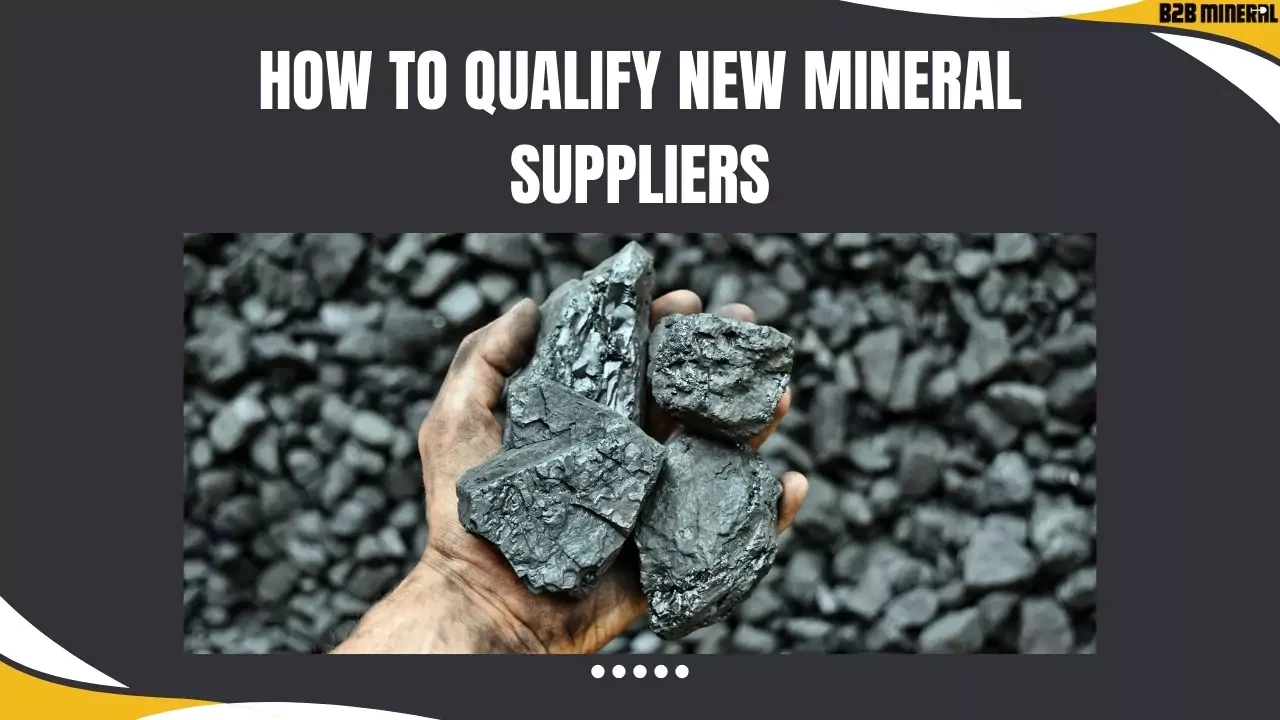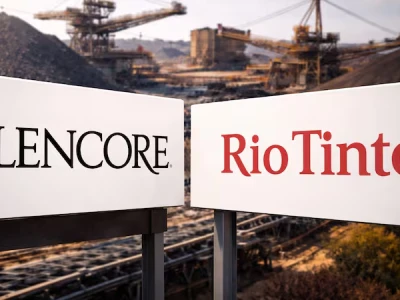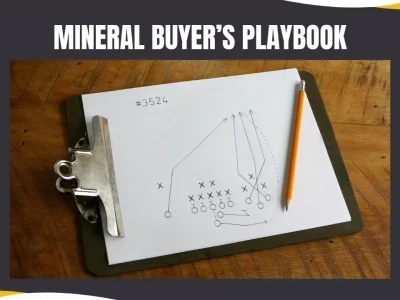Navigating the mineral market comes with unique complexities. Whether you’re sourcing industrial minerals, rare earth elements, or bulk raw materials, one thing is clear: qualifying new suppliers is not a box-checking task, it is a critical foundation for building a stable, transparent, and efficient supply chain.
Choosing the wrong supplier can lead to costly shipment delays, inconsistent material quality, and violations of environmental or trade regulations. These risks not only affect your operations but can also damage your brand’s reputation. To avoid such setbacks, buyers must develop a reliable qualification process that prioritizes long-term trust, compliance with global standards, and resilience across fluctuating market conditions.
Why Supplier Qualification Matters
A well-defined supplier qualification process helps ensure that every new partnership meets key expectations from product quality and regulatory compliance to ethical sourcing and logistical performance. In the mineral industry, where consistency and traceability are crucial, skipping this step often results in financial loss, customer dissatisfaction, and unnecessary exposure to legal risks.
Verifying a supplier’s ability to deliver reliably isn’t just best practice, it's a strategic necessity. Without proper vetting, companies leave themselves vulnerable to disruptions, especially in a market where margins are tight and competition is global. By investing in a structured approach to supplier evaluation, mineral buyers strengthen their supply chain and gain a competitive edge in both cost and reliability.
Key Criteria for Evaluating New Suppliers
Effective supplier evaluation in the mineral industry goes beyond surface-level checks. To ensure reliability, buyers must examine several core dimensions, starting with legal compliance. A trustworthy supplier should hold valid business licenses, mining permits, and up-to-date registrations aligned with national and international regulations.
Next comes certification. Reputable mineral suppliers typically possess globally recognized standards such as ISO 9001 for quality management, ISO 14001 for environmental compliance, or ISO 45001 for occupational safety. These certifications provide insight into the supplier’s commitment to operational excellence and risk management.
Financial health is another key factor. Reviewing audited financial statements or credit ratings helps assess the supplier’s long-term viability, especially for contracts involving large or recurring volumes. Operational capacity also matters: Does the supplier have the infrastructure, equipment, and workforce to meet your demand during peak periods? Delays often stem from underestimating this aspect.
Lastly, a strong internal quality control system is essential. Inconsistent product batches, contamination, or packaging failures can severely affect downstream processes. Buyers should inquire about the supplier’s inspection routines, batch testing methods, and incident response protocols to ensure consistency and transparency throughout the supply chain.
Verifying Supplier Credentials and Certifications

Thorough documentation review is the backbone of supplier verification. Buyers should begin by requesting critical credentials, including business registration documents, mining licenses, and compliance records. These establish the legal status of the company, but they are only the starting point.
International certifications add another layer of trust. Certifications like ISO 9001 or ISO 14001 demonstrate a structured approach to quality and sustainability. However, not all certifications carry equal weight. It is important to verify whether they were issued by accredited organizations and are still valid. Outdated or unverifiable certificates should raise red flags.
Independent third-party audits, such as those conducted by SGS, Bureau Veritas, or TÜV, offer additional assurance. These reports often include evaluations of safety protocols, process controls, and environmental impact areas that internal documents may not fully cover. Buyers should request recent audit summaries or full reports, especially when engaging with suppliers from high-risk regions.
A proper paper trail also helps prevent future disputes. Keeping digital records of all credentials, and confirming them with issuing bodies when possible, not only minimizes the chance of fraud but also strengthens your company’s due diligence process in case of legal or compliance reviews.
Assessing Product Quality and Samples
In the mineral industry, product quality can vary significantly not just between suppliers, but even between different batches from the same source. That’s why requesting samples and conducting independent lab tests is one of the most critical steps in qualifying a new supplier.
Buyers should never rely solely on technical datasheets or verbal claims. Instead, mineral samples should be sent to certified laboratories for detailed analysis. These labs can test for purity, chemical composition, particle size, moisture content, and other physical and chemical properties that affect usability in industrial applications. Test methods should align with global standards such as ASTM, ISO, or equivalent regional benchmarks.
Third-party testing helps identify potential inconsistencies before a major order is placed. It also serves as a benchmark for evaluating future shipments. By comparing actual results with supplier specifications, buyers can assess whether the supplier is capable of delivering consistently within acceptable tolerance levels.
Some buyers skip this step in an effort to speed up procurement — a decision that often leads to costly mistakes. Disputes over material quality are one of the most common sources of breakdowns in mineral trade relationships. Taking the time to verify product quality upfront builds confidence, reduces return rates, and improves downstream process efficiency.
Checking Reliability and Delivery Capacity
Reliable delivery is just as important as product quality when qualifying a new mineral supplier. Even high-grade materials lose their value if they arrive late, irregularly, or in incomplete quantities. For this reason, buyers must thoroughly assess a supplier’s ability to deliver consistently under real-world conditions.
Start by reviewing the supplier’s historical performance. Have they met delivery timelines for previous clients? Can they provide references or performance metrics? Late deliveries, order discrepancies, or unresolved complaints are clear warning signs. Reviewing their track record gives valuable insight into how the supplier manages scheduling, inventory, and logistics.
It’s also important to understand the supplier’s production capacity. A supplier may appear promising on paper but may not have the infrastructure, staffing, or equipment to scale production quickly when demand increases. Ask for production data, output history, and contingency plans in case of supply chain disruptions.
Logistics capabilities should not be overlooked. Does the supplier manage shipping internally or through third parties? Are they familiar with international documentation, customs procedures, and transport regulations? A supplier that understands global freight dynamics is less likely to cause delays due to paperwork errors or poor coordination.
In competitive mineral markets, a delay of even a few days can have a cascading financial impact. Evaluating a supplier’s reliability in advance helps ensure that your operations remain efficient and resilient, even when market conditions become challenging.
Leveraging B2B Platforms for Easier Qualification

Digital B2B platforms have transformed the way buyers find, evaluate, and qualify mineral suppliers. Instead of relying solely on referrals or cold outreach, procurement teams now have access to centralized marketplaces that offer verified supplier profiles, real-time data, and built-in tools to streamline the qualification process.
Platforms like b2bmineral allow you to buy minerals, search and compare suppliers based on product categories, certifications, pricing, and past performance. Verified profiles often include essential documents such as ISO certifications, audit summaries, and shipping history. This transparency reduces the risk of dealing with fraudulent or underperforming vendors.
One of the most powerful features of B2B platforms is the Request for Quotation (RFQ) system. Buyers can submit detailed RFQs to multiple suppliers simultaneously, making it easier to compare responses, delivery timelines, and commercial terms. This leads to more competitive offers and faster decision-making.
Additionally, these platforms often include user reviews, ratings, and transaction histories that provide a clearer picture of supplier reliability. In fast-moving markets like minerals and metals, being able to quickly qualify trustworthy suppliers gives companies a strategic advantage in both cost and supply chain stability.
Red Flags to Watch Out For
While most suppliers present themselves professionally, certain warning signs should not be ignored during the qualification process. Identifying and acting on these red flags early can save buyers from costly mistakes and operational setbacks.
A major red flag is reluctance or refusal to provide verifiable documentation. Legitimate suppliers should have no issue sharing business licenses, certifications, or audit reports. If these documents are unavailable, outdated, or unverifiable, proceed with caution.
Inconsistent communication is another concern. Delayed responses, vague answers to technical questions, or constantly shifting product specifications may indicate disorganization or intentional misrepresentation. These issues often translate into real-world problems during fulfillment and post-sale support.
Buyers should also watch for suppliers who offer prices that are significantly below market averages without clear justification. While competitive pricing is attractive, it may signal compromised quality, lack of compliance, or financial instability.
Finally, assess the supplier’s approach to environmental, social, and ethical practices. A lack of transparency in these areas can lead to reputational damage, especially for companies operating under strict ESG policies or international standards.
Remaining alert to these signals ensures that only qualified, reliable, and ethical suppliers become part of your supply network.
Building Trust and Long-Term Partnerships
Once a supplier has passed all qualification stages, the next step is not just placing an order, it's building a long-term, strategic partnership. In the mineral trade, where market conditions are volatile and supply chain disruptions are common, strong supplier relationships can become a critical competitive advantage.
Trust is built over time through transparency, consistent performance, and mutual understanding. Long-term partnerships often come with added benefits such as priority during shortages, flexible payment terms, shared logistics planning, and access to better pricing. These advantages are especially valuable when working across borders or in regions where sourcing alternatives are limited.
Proactive communication is key. Regular performance reviews, joint quality improvement initiatives, and early involvement in product development can strengthen the relationship and align goals. When suppliers feel valued and informed, they are more likely to invest in delivering better service, more consistent quality, and faster turnaround times.
Strategic supplier relationships are not only about securing raw materials they are about building resilience and agility into your entire supply chain. Buyers who cultivate these relationships gain long-term stability, lower transaction risks, and better responsiveness in dynamic markets.
Conclusion

Qualifying new mineral suppliers is far more than a checklist; it's a strategic investment in your company’s future stability, efficiency, and reputation. By conducting thorough evaluations of legal compliance, certifications, financial health, product quality, and delivery reliability, buyers can make informed decisions that minimize risk and maximize value.
Digital B2B platforms make this process faster and more transparent, while helping buyers avoid unreliable or non-compliant vendors. At the same time, remaining alert to red flags and maintaining strict due diligence protects your business from costly mistakes.
Ultimately, the goal is not just to find a supplier, but to establish a reliable, ethical, and performance-driven partnership. In a global mineral market that is becoming more competitive and regulated, this mindset sets leading companies apart. Supplier qualification should be seen not as a one-time event, but as an ongoing process, one that supports long-term growth, operational excellence, and sustainable success.
.j.webp)










.j_s_thumb.webp)
